#account management template
Text
#account management template#admin template#bootstrap 4#bootstrap admin template#chat#clean template#customer management template#expense management template#invoice management template#multipurpose template#payment management template#responsive admin template#sales management template
0 notes
Text
Small Business Accounting Software | CRM Software App
Transform your small business finances with CRM Software App's cutting-edge Small Business Accounting Software. Effortlessly manage transactions, gain financial insights, and boost efficiency. Empower your business for success. #AccountingSoftware #SmallBusiness
#small business crm#Small Business Accounting Software#customer relationship management#invoice template#crm software app
0 notes
Text
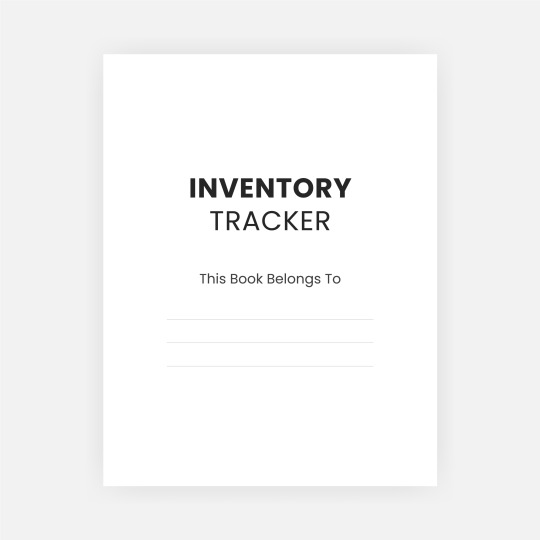
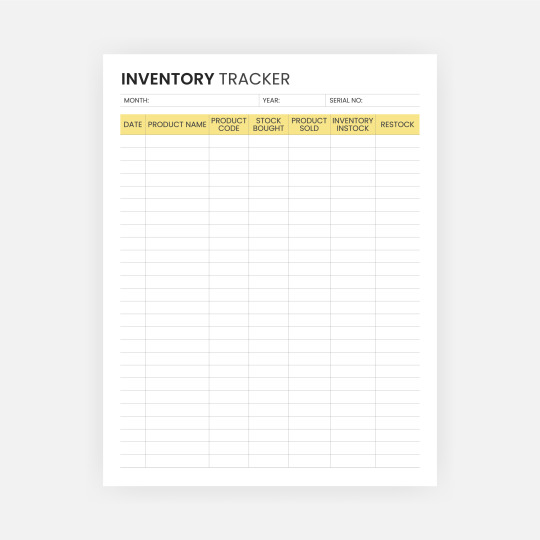
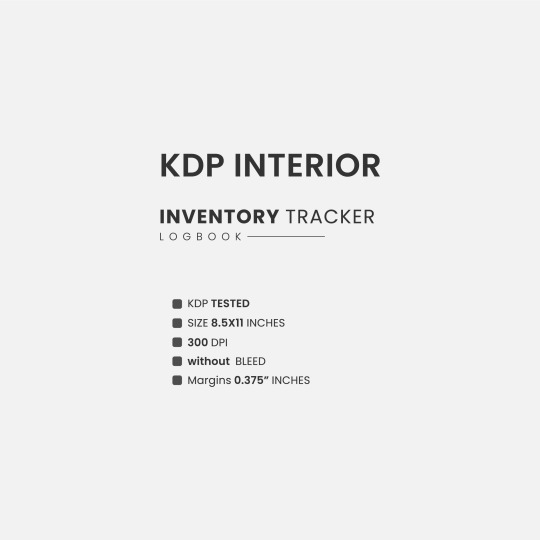
Inventory Management Tracker Logbook sheet Printable KDP Interior Template
Inventory means the act of counting or listing items in a business. Your business needs an inventory tracker to list the products. Inventory management is controlling and optimizing stock levels, locations, and movements of inventory.
#inventory#inventorymanagement#kdpinterior#business#tracker#smallbusiness#inventorytracker#accounting#warehouse#realestate#sales#amazonkdp#template#logistics#ecommerce#kindleunlimited#success#management#entrepreneur#manufacturing#kdp#booking#propershade#loveyourstylist#effective#optimizing#stock#movements#inventorymanagment#products
1 note
·
View note
Text
ooohhhhh mytgg gooddddd I was given 3 simple tasks that are not being simple!!!
#personal#i had two order two separate things and print some shirts#but first the shirts started BLEEDING like the red is everywhere on a white tshirt#so like. not ideal!!#and then i had to order something off amazon and you cant check out as a guest apparently#so i finally got into the company account#and it cant verify the fucking addrre#*address???? like the fucking shop itself doesn't exist#so can't do that#bought a template and almost couldn't check out there but i got it#but now it wont send me the download code?????#screaming crying throwing up#i called my manager and hes like uhh and hands me off to coworker who also is like idk!!#like guys come on!!!!!!#so i guess im just not doing jack or shit today#at least until they get back#they're out installing some signs that i made :3#i hope they send me pics bc im super excited to see those up
0 notes
Text
Maximizing Your Film's Financial Potential: A Complete Budgeting Handbook
🎥📊 Ready to take your film to the next level? Check out our new budgeting handbook to maximize your financial potential! 💰🤑 #filmfinance #budgetinghandbook #financialpotential
If you’re planning to create a film, it’s important to have a clear understanding of your finances. Budgeting is a crucial aspect of filmmaking, as it ensures that you have enough resources to bring your vision to life. With the right approach, you can maximize your film’s financial potential and create a masterpiece that captivates your audience. In this budgeting handbook, we’ll cover all the…

View On WordPress
#budget allocation#budget analysis#budget forecasting#budget management#budget planning#budget preparation#budget software#budget template#budgeting handbook#budgeting tips#cost estimation#cost management#expense tracking#film accounting#film budgeting#film finance#film funding#film industry#film production#filmmaking#financial control#financial planning#independent film#money management#movie budget#production budget#project budget
1 note
·
View note
Text
free resources to write a novel in 2024
hello hello! it's me, rach!
as the new year approaches, many of us set goals and resolutions - myself included. one of my goals for 2024 is to write a novel (I've been procrastinating on this for quite a long time now). i assume that some of you might have the same goal, that's why I'm writing this post today.
over 2023 i've been releasing some freebies for authors just like me, so I thought I could compile my favorites in this post. hope you find this useful :)
1) the writer's workbook
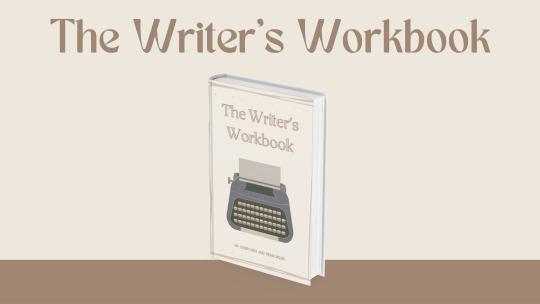
this workbook has over 60 exercises to help you develop characters, scenarios, etc. if you're ever stuck, I'm pretty sure this workbook will be your best friend.
2) author's corner (notion template)

this is the most downloaded freebie in my shop! it is a notion dashboard with everything you need to organize your writing and has some templates included (like scrivener)!!
3) another notion template

this one has two themes you can choose from: cottage-core and dark academia. they're very similar to the previous template, but this one is more recent and I added some new features. feel free to explore both and pick the one you like the most.
4) the author's journal

this is a cute printable with 20 pages that will help you stay on track and manage your social media accounts as a writer who shares their work online. you can also register what you're currently writing and your personal research and resources.
5) plan your book printable

this is a 6-page printable for you to fill out and plan your book easily and effectively.
6) excel sheet to organize tasks & word-count
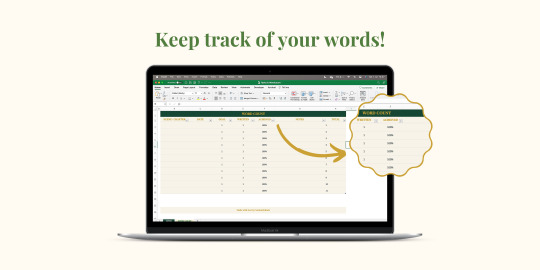
this is a simple excel sheet, but it is very effective for keeping track of your tasks & word-count of your novels. also, it is 100% customizable to your liking!
that's all for now! feel free to explore my gumroad shop where I have plenty of freebies to grab! also, don't forget to subscribe so that you never miss any opportunity to get a goodie for free :)
hope this post was useful!
have a nice day,
rach
#writing resources#writing#writeblr#writer tips#writing advice#writing help#writing tips#poetsandwriters#resources#research#wattpad#nanowrimo#creative writing#writerscommunity#writers#writing inspiration#writing prompts#writing reference#writerslife#writersofinstagram#software#inspiration#writing inspo#for writing#for writers#for whoever needs it#writing research#researching#we love an useful post#useful
3K notes
·
View notes
Text
Employee Call Log
Download free excel template for capturing enquiries and service request from Employees in an organization or entity. This template can be useful for administration department or health care department in an organization.
Importance of call log for employees in organization
Talking about any organization, there are various departments. Each department can be categorized as profit center, cost…
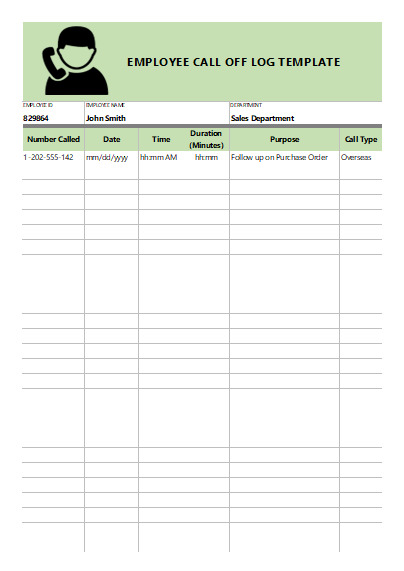
View On WordPress
#account management call log#backup and restore call logs#call#call history recovery#call log#call log android#call log backup/restore#call log interaction#call log restore#call log template#call log to excel#call log tracking#call logs#call logs not showing#how to backup call logs#name format for call history#no call log history showing#phone call log template pdf#sales team call log#samsung call log
0 notes
Text
worker uprisings are not an upside.
I see this rhetoric here all the time, and it drives me up the wall. So you're all getting a good rant here: a worker uprising is not good.
The worker uprisings that bought the NLRB paid for it in blood and lives, and another uprising means that we will have to find the price to buy it again. And there will be families, people, and lives blighted in the meantime. Worker uprisings are not upsides for anyone and they are not fucking consolation prizes. They happen when things go bad, horribly bad, and they generally only result in positive change insofar as they create so much chaos, bloodshed, and disruption that the overall situation has to change. In the mean time, people are still left dead, destitute, and maimed. If we can avert a worker uprising by using nonviolent means of pressure to force accountability, we should do that, because it results in vastly more stable outcomes for everyone. If this pissant, damn-fool shortsighted Supreme Court decision goes through and violence is the only remaining option to enforce change that anyone sees, that is a bad thing.That is not a flood gift. People will die fixing that bullshit. People did die fixing that bullshit!
You know how we got the NLRB the first time, back in 1935?
It took almost fifty years of labor unrest in the United States before we got the NLRB. Let's start with the Great Railroad Strike of 1877 (which was majorly disruptive but happened before labor unionizing was widespread). That's a great template for your fucking worker's uprising: there's no union leadership to coordinate fury and direct it properly, so when workers lose their shit after the third goddamn time wages get cut (not "fail to keep the pace of inflation," actually "you get less money now"), they all kind of do things on impulse without thinking much about long term strategy. The fury just erupts. In the case of the Great Railroad Strike, angry workers burned factories and facilities, seized rail facilities, paralyzed commerce networks, and existing power structures panicked and called out militias, National Guard units, and federal troops to forcibly suppress the workers. About a hundred people died.
Let me pop a cut down while I talk about what happened next. Spoiler: there's a lot of violence under the hood coming up, and like all violence, it absolutely sloshes around and hits people who aren't necessarily directly involved in conflicts.
You have continuing incidences of violence over strikes throughout the next several decades as nonviolent strikes are met with violence from pro-employer forces and workers resist with violence back. I can't even list all the violent incidents here that ended in deaths, because they were frequent. The 1892 Coeur d'Alune labor strike broke out into an actual shooting war and resulted in a number of deaths, not to mention months of detainment for six hundred protesting miners; the same year, you have another shooting war kicked off between hundreds of massed paid private Pinkerton security and striking workers in Pittsburgh through the Homestead Strike. Imagine how that's going to go down today.
And the thing about violence like this, and tolerance for violence, is that eventually you just get used to using it to get your way. You actually also do see quite a bit of violence conducted by striking labor workers, sometimes without recent provocation from management. For example, the national International Association of Bridge Structural Iron Workers embarked on a campaign of bombings from 1906-1911 that eventually culminated in a bombing of the office of the LA Times that killed 20 people. Do you want to live in a world where the only way to resolve conflicts like this is to risk someone bombing your office because your boss mouthed off at his cause? Even if he's right, do you want to risk losing your life, your arms, your friend, your sibs, to someone who thinks that the only option available to him to address systematic inequality is violence?
And you think about who really suffers when violence erupts, too. Look at the East St Louis massacre in 1917, when management tries undercutting the local white-run unions by hiring black folks who are systematically excluded by the unions. (If you think labor solidarity is free from the same intersectional forces that hit every other attempt to organize in solidarity for humans, you really need to go back and revisit your history books. We can do better and we should, but when we set up our systems and hope for the future, we have to be clear-eyed about the failures of the past.) Anyway, when labor tensions between white union workers and management's preferred use of cheaper, poorer, less "uppity" black people erupted, the white union workers attacked not management, but the black parts of town. They cut the hoses to the fucking fire department, burned huge swathes of East St Louis belonging to black homeowners, and shot black folks fleeing in the streets.
Money might not trickle down, but violence sure fucking does. The wealthy insulate themselves from violence by employing intermediaries to do all the dirty work for them, or even to venture into any areas that might be dangerous. When we resort to violence as the only way to solve our problems, inevitably the people and communities who pay the highest blood prices are the ones who have the least to provide. You think any of those robber barons are going to wind up on the ground bleeding out? They have their Pinkerton troops for that shit. The worst they lose is money; the rest of us have to stake our bodies and our homes.
No one should look forward to a worker uprising. If the Supreme Court is stupid and short-sighted enough to reduce avenues of worker redress to extra-legal means, the worker uprisings will come back around again, sure enough, and we'll all write our demands in blood once again. But the whole fucking POINT of the NLRB is that the federal government objects to having to sort these things out when they dissolve into open violence, so it sets rules about what the stupid short-sighted greediguts fat cats up top can do to reduce violence erupting again.
Anyway. Best thing I can think of right now is to get a Congressional supermajority in with the eye of imposing limits and curbs on the Court. Because look, I'll march if I need to, but I ain't going to pretend the thought puts a smile in my mouth and a spring in my step. Fuck.
206 notes
·
View notes
Text
In defense of bureaucratic competence

Sure, sometimes it really does make sense to do your own research. There's times when you really do need to take personal responsibility for the way things are going. But there's limits. We live in a highly technical world, in which hundreds of esoteric, potentially lethal factors impinge on your life every day.
You can't "do your own research" to figure out whether all that stuff is safe and sound. Sure, you might be able to figure out whether a contractor's assurances about a new steel joist for your ceiling are credible, but after you do that, are you also going to independently audit the software in your car's antilock brakes?
How about the nutritional claims on your food and the sanitary conditions in the industrial kitchen it came out of? If those turn out to be inadequate, are you going to be able to validate the medical advice you get in the ER when you show up at 3AM with cholera? While you're trying to figure out the #HIPAAWaiver they stuck in your hand on the way in?
40 years ago, Ronald Reagan declared war on "the administrative state," and "government bureaucrats" have been the favored bogeyman of the American right ever since. Even if Steve Bannon hasn't managed to get you to froth about the "Deep State," there's a good chance that you've griped about red tape from time to time.
Not without reason, mind you. The fact that the government can make good rules doesn't mean it will. When we redid our kitchen this year, the city inspector added a bunch of arbitrary electrical outlets to the contractor's plans in places where neither we, nor any future owner, will every need them.
But the answer to bad regulation isn't no regulation. During the same kitchen reno, our contractor discovered that at some earlier time, someone had installed our kitchen windows without the accompanying vapor-barriers. In the decades since, the entire structure of our kitchen walls had rotted out. Not only was the entire front of our house one good earthquake away from collapsing – there were two half rotted verticals supporting the whole thing – but replacing the rotted walls added more than $10k to the project.
In other words, the problem isn't too much regulation, it's the wrong regulation. I want our city inspectors to make sure that contractors install vapor barriers, but to not demand superfluous electrical outlets.
Which raises the question: where do regulations come from? How do we get them right?
Regulation is, first and foremost, a truth-seeking exercise. There will never be one obvious answer to any sufficiently technical question. "Should this window have a vapor barrier?" is actually a complex question, needing to account for different window designs, different kinds of barriers, etc.
To make a regulation, regulators ask experts to weigh in. At the federal level, expert agencies like the DoT or the FCC or HHS will hold a "Notice of Inquiry," which is a way to say, "Hey, should we do something about this? If so, what should we do?"
Anyone can weigh in on these: independent technical experts, academics, large companies, lobbyists, industry associations, members of the public, hobbyist groups, and swivel-eyed loons. This produces a record from which the regulator crafts a draft regulation, which is published in something called a "Notice of Proposed Rulemaking."
The NPRM process looks a lot like the NOI process: the regulator publishes the rule, the public weighs in for a couple of rounds of comments, and the regulator then makes the rule (this is the federal process; state regulation and local ordinances vary, but they follow a similar template of collecting info, making a proposal, collecting feedback and finalizing the proposal).
These truth-seeking exercises need good input. Even very competent regulators won't know everything, and even the strongest theoretical foundation needs some evidence from the field. It's one thing to say, "Here's how your antilock braking software should work," but you also need to hear from mechanics who service cars, manufacturers, infosec specialists and drivers.
These people will disagree with each other, for good reasons and for bad ones. Some will be sincere but wrong. Some will want to make sure that their products or services are required – or that their competitors' products and services are prohibited.
It's the regulator's job to sort through these claims. But they don't have to go it alone: in an ideal world, the wrong people will be corrected by other parties in the docket, who will back up their claims with evidence.
So when the FCC proposes a Net Neutrality rule, the monopoly telcos and cable operators will pile in and insist that this is technically impossible, that there is no way to operate a functional ISP if the network management can't discriminate against traffic that is less profitable to the carrier. Now, this unity of perspective might reflect a bedrock truth ("Net Neutrality can't work") or a monopolists' convenient lie ("Net Neutrality is less profitable for us").
In a competitive market, there'd be lots of counterclaims with evidence from rivals: "Of course Net Neutrality is feasible, and here are our server logs to prove it!" But in a monopolized markets, those counterclaims come from micro-scale ISPs, or academics, or activists, or subscribers. These counterclaims are easy to dismiss ("what do you know about supporting 100 million users?"). That's doubly true when the regulator is motivated to give the monopolists what they want – either because they are hoping for a job in the industry after they quit government service, or because they came out of industry and plan to go back to it.
To make things worse, when an industry is heavily concentrated, it's easy for members of the ruling cartel – and their backers in government – to claim that the only people who truly understand the industry are its top insiders. Seen in that light, putting an industry veteran in charge of the industry's regulator isn't corrupt – it's sensible.
All of this leads to regulatory capture – when a regulator starts defending an industry from the public interest, instead of defending the public from the industry. The term "regulatory capture" has a checkered history. It comes out of a bizarre, far-right Chicago School ideology called "Public Choice Theory," whose goal is to eliminate regulation, not fix it.
In Public Choice Theory, the biggest companies in an industry have the strongest interest in capturing the regulator, and they will work harder – and have more resources – than anyone else, be they members of the public, workers, or smaller rivals. This inevitably leads to capture, where the state becomes an arm of the dominant companies, wielded by them to prevent competition:
https://pluralistic.net/2022/06/05/regulatory-capture/
This is regulatory nihilism. It supposes that the only reason you weren't killed by your dinner, or your antilock brakes, or your collapsing roof, is that you just got lucky – and not because we have actual, good, sound regulations that use evidence to protect us from the endless lethal risks we face. These nihilists suppose that making good regulation is either a myth – like ancient Egyptian sorcery – or a lost art – like the secret to embalming Pharaohs.
But it's clearly possible to make good regulations – especially if you don't allow companies to form monopolies or cartels. What's more, failing to make public regulations isn't the same as getting rid of regulation. In the absence of public regulation, we get private regulation, run by companies themselves.
Think of Amazon. For decades, the DoJ and FTC sat idly by while Amazon assembled and fortified its monopoly. Today, Amazon is the de facto e-commerce regulator. The company charges its independent sellers 45-51% in junk fees to sell on the platform, including $31b/year in "advertising" to determine who gets top billing in your searches. Vendors raise their Amazon prices in order to stay profitable in the face of these massive fees, and if they don't raise their prices at every other store and site, Amazon downranks them to oblivion, putting them out of business.
This is the crux of the FTC's case against Amazon: that they are picking winners and setting prices across the entire economy, including at every other retailer:
https://pluralistic.net/2023/04/25/greedflation/#commissar-bezos
The same is true for Google/Facebook, who decide which news and views you encounter; for Apple/Google, who decide which apps you can use, and so on. The choice is never "government regulation" or "no regulation" – it's always "government regulation" or "corporate regulation." You either live by rules made in public by democratically accountable bureaucrats, or rules made in private by shareholder-accountable executives.
You just can't solve this by "voting with your wallet." Think about the problem of robocalls. Nobody likes these spam calls, and worse, they're a vector for all kinds of fraud. Robocalls are mostly a problem with federation. The phone system is a network-of-networks, and your carrier is interconnected with carriers all over the world, sometimes through intermediaries that make it hard to know which network a call originates on.
Some of these carriers are spam-friendly. They make money by selling access to spammers and scammers. Others don't like spam, but they have lax or inadequate security measures to prevent robocalls. Others will simply be targets of opportunity: so large and well-resourced that they are irresistible to bad actors, who continuously probe their defenses and exploit overlooked flaws, which are quickly patched.
To stem the robocall tide, your phone company will have to block calls from bad actors, put sloppy or lazy carriers on notice to shape up or face blocks, and also tell the difference between good companies and bad ones.
There's no way you can figure this out on your own. How can you know whether your carrier is doing a good job at this? And even if your carrier wants to do this, only the largest, most powerful companies can manage it. Rogue carriers won't give a damn if some tiny micro-phone-company threatens them with a block if they don't shape up.
This is something that a large, powerful government agency is best suited to addressing. And thankfully, we have such an agency. Two years ago, the FCC demanded that phone companies submit plans for "robocall mitigation." Now, it's taking action:
https://arstechnica.com/tech-policy/2023/10/telcos-filed-blank-robocall-plans-with-fcc-and-got-away-with-it-for-2-years/
Specifically, the FCC has identified carriers – in the US and abroad – with deficient plans. Some of these plans are very deficient. National Cloud Communications of Texas sent the FCC a Windows Printer Test Page. Evernex (Pakistan) sent the FCC its "taxpayer profile inquiry" from a Pakistani state website. Viettel (Vietnam) sent in a slide presentation entitled "Making Smart Cities Vision a Reality." Canada's Humbolt VoIP sent an "indiscernible object." DomainerSuite submitted a blank sheet of paper scrawled with the word "NOTHING."
The FCC has now notified these carriers – and others with less egregious but still deficient submissions – that they have 14 days to fix this or they'll be cut off from the US telephone network.
This is a problem you don't fix with your wallet, but with your ballot. Effective, public-interest-motivated FCC regulators are a political choice. Trump appointed the cartoonishly evil Ajit Pai to run the FCC, and he oversaw a program of neglect and malice. Pai – a former Verizon lawyer – dismantled Net Neutrality after receiving millions of obviously fraudulent comments from stolen identities, lying about it, and then obstructing the NY Attorney General's investigation into the matter:
https://pluralistic.net/2021/08/31/and-drown-it/#starve-the-beast
The Biden administration has a much better FCC – though not as good as it could be, thanks to Biden hanging Gigi Sohn out to dry in the face of a homophobic smear campaign that ultimately led one of the best qualified nominees for FCC commissioner to walk away from the process:
https://pluralistic.net/2022/12/15/useful-idiotsuseful-idiots/#unrequited-love
Notwithstanding the tragic loss of Sohn's leadership in this vital agency, Biden's FCC – and its action on robocalls – illustrates the value of elections won with ballots, not wallets.
Self-regulation without state regulation inevitably devolves into farce. We're a quarter of a century into the commercial internet and the US still doesn't have a modern federal privacy law. The closest we've come is a disclosure rule, where companies can make up any policy they want, provided they describe it to you.
It doesn't take a genius to figure out how to cheat on this regulation. It's so simple, even a Meta lawyer can figure it out – which is why the Meta Quest VR headset has a privacy policy isn't merely awful, but long.
It will take you five hours to read the whole document and discover how badly you're being screwed. Go ahead, "do your own research":
https://foundation.mozilla.org/en/privacynotincluded/articles/annual-creep-o-meter/
The answer to bad regulation is good regulation, and the answer to incompetent regulators is competent ones. As Michael Lewis's Fifth Risk (published after Trump filled the administrative agencies with bootlickers, sociopaths and crooks) documented, these jobs demand competence:
https://memex.craphound.com/2018/11/27/the-fifth-risk-michael-lewis-explains-how-the-deep-state-is-just-nerds-versus-grifters/
For example, Lewis describes how a Washington State nuclear waste facility created as part of the Manhattan Project endangers the Columbia River, the source of 8 million Americans' drinking water. The nuclear waste cleanup is projected to take 100 years and cost 100 billion dollars. With stakes that high, we need competent bureaucrats overseeing the job.
The hacky conservative jokes comparing every government agency to the DMV are not descriptive so much as prescriptive. By slashing funding, imposing miserable working conditions, and demonizing the people who show up for work anyway, neoliberals have chased away many good people, and hamstrung those who stayed.
One of the most inspiring parts of the Biden administration is the large number of extremely competent, extremely principled agency personnel he appointed, and the speed and competence they've brought to their roles, to the great benefit of the American public:
https://pluralistic.net/2022/10/18/administrative-competence/#i-know-stuff
But leaders can only do so much – they also need staff. 40 years of attacks on US state capacity has left the administrative state in tatters, stretched paper-thin. In an excellent article, Noah Smith describes how a starveling American bureaucracy costs the American public a fortune:
https://www.noahpinion.blog/p/america-needs-a-bigger-better-bureaucracy
Even stripped of people and expertise, the US government still needs to get stuff done, so it outsources to nonprofits and consultancies. These are the source of much of the expense and delay in public projects. Take NYC's Second Avenue subway, a notoriously overbudget and late subway extension – "the most expensive mile of subway ever built." Consultants amounted to 20% of its costs, double what France or Italy would have spent. The MTA used to employ 1,600 project managers. Now it has 124 of them, overseeing $20b worth of projects. They hand that money to consultants, and even if they have the expertise to oversee the consultants' spending, they are stretched too thin to do a good job of it:
https://slate.com/business/2023/02/subway-costs-us-europe-public-transit-funds.html
When a public agency lacks competence, it ends up costing the public more. States with highly expert Departments of Transport order better projects, which need fewer changes, which adds up to massive costs savings and superior roads:
https://papers.ssrn.com/sol3/papers.cfm?abstract_id=4522676
Other gaps in US regulation are plugged by nonprofits and citizen groups. Environmental rules like NEPA rely on the public to identify and object to environmental risks in public projects, from solar plants to new apartment complexes. NEPA and its state equivalents empower private actors to sue developers to block projects, even if they satisfy all environmental regulations, leading to years of expensive delay.
The answer to this isn't to dismantle environmental regulations – it's to create a robust expert bureaucracy that can enforce them instead of relying on NIMBYs. This is called "ministerial approval" – when skilled government workers oversee environmental compliance. Predictably, NIMBYs hate ministerial approval.
Which is not to say that there aren't problems with trusting public enforcers to ensure that big companies are following the law. Regulatory capture is real, and the more concentrated an industry is, the greater the risk of capture. We are living in a moment of shocking market concentration, thanks to 40 years of under-regulation:
https://www.openmarketsinstitute.org/learn/monopoly-by-the-numbers
Remember that five-hour privacy policy for a Meta VR headset? One answer to these eye-glazing garbage novellas presented as "privacy policies" is to simply ban certain privacy-invading activities. That way, you can skip the policy, knowing that clicking "I agree" won't expose you to undue risk.
This is the approach that Bennett Cyphers and I argue for in our EFF white-paper, "Privacy Without Monopoly":
https://www.eff.org/wp/interoperability-and-privacy
After all, even the companies that claim to be good for privacy aren't actually very good for privacy. Apple blocked Facebook from spying on iPhone owners, then sneakily turned on their own mass surveillance system, and lied about it:
https://pluralistic.net/2022/11/14/luxury-surveillance/#liar-liar
But as the European experiment with the GDPR has shown, public administrators can't be trusted to have the final word on privacy, because of regulatory capture. Big Tech companies like Google, Apple and Facebook pretend to be headquartered in corporate crime havens like Ireland and Luxembourg, where the regulators decline to enforce the law:
https://pluralistic.net/2023/05/15/finnegans-snooze/#dirty-old-town
It's only because of the GPDR has a private right of action – the right of individuals to sue to enforce their rights – that we're finally seeing the beginning of the end of commercial surveillance in Europe:
https://www.eff.org/deeplinks/2022/07/americans-deserve-more-current-american-data-privacy-protection-act
It's true that NIMBYs can abuse private rights of action, bringing bad faith cases to slow or halt good projects. But just as the answer to bad regulations is good ones, so too is the answer to bad private rights of action good ones. SLAPP laws have shown us how to balance vexatious litigation with the public interest:
https://www.rcfp.org/resources/anti-slapp-laws/
We must get over our reflexive cynicism towards public administration. In my book The Internet Con, I lay out a set of public policy proposals for dismantling Big Tech and putting users back in charge of their digital lives:
https://www.versobooks.com/products/3035-the-internet-con
The most common objection I've heard since publishing the book is, "Sure, Big Tech has enshittified everything great about the internet, but how can we trust the government to fix it?"
We've been conditioned to think that lawmakers are too old, too calcified and too corrupt, to grasp the technical nuances required to regulate the internet. But just because Congress isn't made up of computer scientists, it doesn't mean that they can't pass good laws relating to computers. Congress isn't full of microbiologists, but we still manage to have safe drinking water (most of the time).
You can't just "do the research" or "vote with your wallet" to fix the internet. Bad laws – like the DMCA, which bans most kinds of reverse engineering – can land you in prison just for reconfiguring your own devices to serve you, rather than the shareholders of the companies that made them. You can't fix that yourself – you need a responsive, good, expert, capable government to fix it.
We can have that kind of government. It'll take some doing, because these questions are intrinsically hard to get right even without monopolies trying to capture their regulators. Even a president as flawed as Biden can be pushed into nominating good administrative personnel and taking decisive, progressive action:
https://doctorow.medium.com/joe-biden-is-headed-to-a-uaw-picket-line-in-detroit-f80bd0b372ab?sk=f3abdfd3f26d2f615ad9d2f1839bcc07
Biden may not be doing enough to suit your taste. I'm certainly furious with aspects of his presidency. The point isn't to lionize Biden – it's to point out that even very flawed leaders can be pushed into producing benefit for the American people. Think of how much more we can get if we don't give up on politics but instead demand even better leaders.
My next novel is The Lost Cause, coming out on November 14. It's about a generation of people who've grown up under good government – a historically unprecedented presidency that has passed the laws and made the policies we'll need to save our species and planet from the climate emergency:
https://us.macmillan.com/books/9781250865939/the-lost-cause
The action opens after the pendulum has swung back, with a new far-right presidency and an insurgency led by white nationalist militias and their offshore backers – seagoing anarcho-capitalist billionaires.
In the book, these forces figure out how to turn good regulations against the people they were meant to help. They file hundreds of simultaneous environmental challenges to refugee housing projects across the country, blocking the infill building that is providing homes for the people whose homes have been burned up in wildfires, washed away in floods, or rendered uninhabitable by drought.
I don't want to spoil the book here, but it shows how the protagonists pursue a multipronged defense, mixing direct action, civil disobedience, mass protest, court challenges and political pressure to fight back. What they don't do is give up on state capacity. When the state is corrupted by wreckers, they claw back control, rather than giving up on the idea of a competent and benevolent public system.

If you'd like an essay-formatted version of this post to read or share, here's a link to it on pluralistic.net, my surveillance-free, ad-free, tracker-free blog:
https://pluralistic.net/2023/10/23/getting-stuff-done/#praxis
#pluralistic#nerd harder#private right of action#privacy#robocalls#fcc#administrative competence#noah smith#spam#regulatory capture#public choice theory#nimbyism#the lost cause#the internet con#evidence based policy#small government#transit#praxis#antitrust#trustbusting#monopoly
379 notes
·
View notes
Text
Fandom 101: Getting Started on Fanlore.org
Not long ago, we at Duck Prints Press decided that we’d like the Press to have a page on Fanlore. To accomplish that, Press contributor Shea Sullivan made an account and figured out the nuts and bolts on how to add pages to Fanlore. Turns out, it’s not very hard, and now in this guest blog post, Shea will teach y’all how to do it too!
Making Your First Fanlore Page!
Hello! I am an editor on Fanlore as of a few days ago. Before that, I’d worked with mediawiki (the open source platform Fanlore uses) for unrelated projects, so I had a general understanding of how things worked, but no idea how Fanlore preferred their pages to be formatted or organized or linked.
This is how I got started!
First: What is Fanlore and Why Should You Care?
Fanlore is a wiki specifically dedicated to the fandom experience. It’s not for canon info about a specific fandom; rather, it’s for information about how fans interact with media and each other. Fanlore is run by the OTW, the same organization that brings us our beloved AO3. This context helped me in understanding the focus of Fanlore. It’s about fandom: the ups, the downs, the trends, the drama…all the things that can get lost forever when sites disappear or there’s a purge. And that said…well, you may still not care. But if you do, read on!
Second: You Care. Now What?
(read more)
Get an account. Right now. It’s worth getting the account, because you won’t be able to create new pages for a few hours. So, get the account first, figure out what to do with it later.
Go to fanlore.org and click on “Create Account” in the upper right-hand corner:

Third: You Have the Power (Soon)!
Read up! No need to invent the wheel in this post – they’ve got some great resources for getting started already written on their webpage.
Fanlore Getting Started Page
General Help Pages on Fanlore
Four hours after you create your account, you can create pages! Congrats! There are a ton of help pages out there, but the questions I had initially were:
How do I make sure this page doesn’t exist already?
Search. Search for the page. Search for key phrases associated with the page. A page name is a fiddly thing, so search for significant phrases in a few different ways before you determine it doesn’t exist. Always make sure you check before you set out to create page!
How do I add this page?
If it’s not there, you’ll see it come up in red when you search. Type the page name you want to create in the search bar. Click “Search” to get all the results, and then click on that red link.
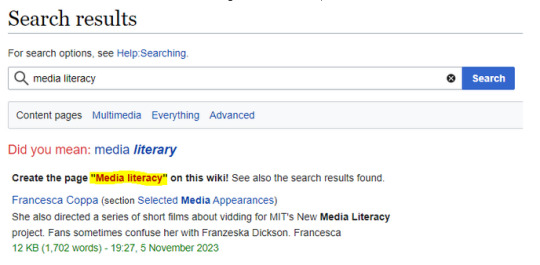
How do I format this page?
You now have an empty page. When I was getting started, my big question was: what should my page look like? Well, Fanlore has templates that can help with that! The templates are in a markup language, but do not fear! Copy and paste the template (everything in the blue box on the template page, typically starting with curly braces), make some updates, and click “Preview.” You can repeat those steps indefinitely until you get the hang of the markup. There’s also a ton of information on the Fanlore.org cheatsheet. (If you’re still confused, keep reading, there’s more specifics under the infobox section.)
Once you have the page created and published, you can edit it without the markup language if you prefer – there’s “Edit,” which gives you a non-code-based option, and an “Edit Source” button, which gives you the code-based option.

If your proposed page topic doesn’t have an official template created for that topic, you can look up similar pages and see how they’re structured. If you’re not sure how they managed to make something look a certain way, click the “Edit Source” button and look at the code there to get a sense of what they did. Be sure to cancel out of the edit when you’re done so you don’t make unintentional changes to someone else’s page! Some pages are locked down (like the template pages) so you can’t make edits, but most “normal” pages will have those links at the top so you can dig in and see what’s there and how the people who wrote that page made it look the way it does.
How do I add an infobox?
Those infoboxes on the right of a lot of pages give a quick overview of important information. These are templates, and you can find a list of available infobox templates here.
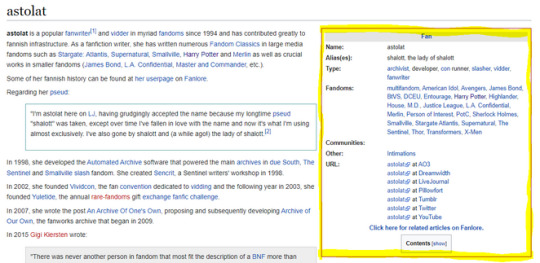
The templates, when you click into them, have a heading and some info that you can fill in. You can’t remove items from the template without making a new template, which I don’t recommend trying when you’re getting started. Use the template, fill in the information, and mark “N/A” if you don’t have information to insert in a specific field. A sample template for an infobox looks like this, and you fill in information after each “equals” sign. You can add a list, and you can add links to these after the equals sign using the markup for internal and external links on the Cheatsheet.
{{FanProfile
|name=
|alias(es)=
|type=
|fandoms=
|communities=
|other=
|url=
}}
If you’re still confused, let’s go to Astolat’s fan page and click “Edit Source” and see how the infobox looks behind the scenes:
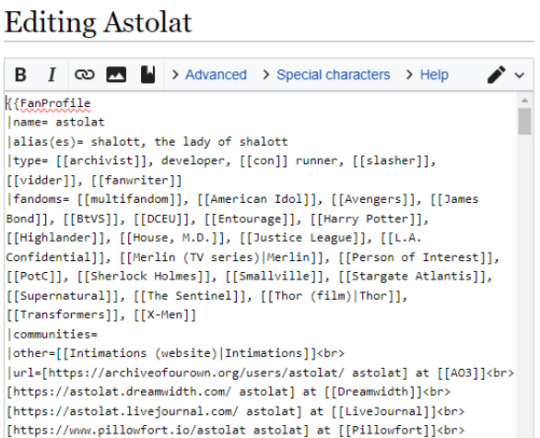
See how everything that was in the original template is still there, there’s just a list of information after the equals sign?
And here’s how it looks formatted:
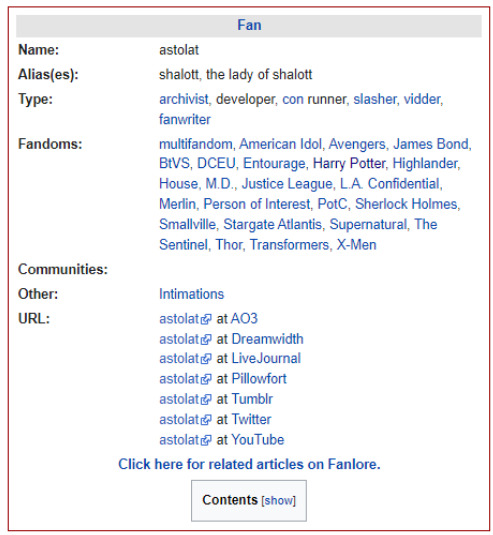
How do I categorize this page?
Categories are important because they help Fanlore’s back-end coding group pages together so people can find the page you’ve created and so the page is in the right place in the site map. If you can’t figure it out, though, don’t worry, there are people who will find it and take care of it!
If you have an infobox from a template, this is taken care of.
If you didn’t use an infobox template, you can add a Category to index the page.
Finding a Category can be a little overwhelming. If you have an example page (another page that contains the same type of content as yours), you can scroll to the bottom of that page and see what Category has been assigned to it. You can add that Category to your page by editing the source and adding that category into your page at the bottom with 2 square brackets, like this: [[Category:YourCategory]]
Use “Preview” to make sure you set it up correctly before saving the page.
If you need to find a category and can’t find a good example page, I recommend going to the sitemap, finding what fits your article the best, and clicking into it. Categories are set up in hierarchies, so click through until you find the Category and Subcategory that fits best.
Add it at the very bottom of the page, and it should show up when you preview, at the very bottom of the page.

How do I add those nifty citation references[1]?
Review theFanlore page on citation formatting for details. The basics are:
Add a blank References heading at the bottom of the page.
Add tags and include the source information.
What is the difference between a citation and an external link? Good question! I don’t know for sure, but the way I’ve been using it, if I make a statement about a thing and I want to direct you to the “proof” (article, webpage, etc), I will use a citation. If there is a thing I’m linking to because it is relevant but not as proof of what I’m saying on the wiki, I will add it as an external link.
Fourth: Don’t Worry
You’ll find there are a lot of instances when you might not be sure what the “right” way is to do whatever it is you’re trying to do. Don’t let that stop you! Do a little research, do your best, and be okay with a learning curve.
The thing about wiki editing in general, and this includes Fanlore, is that it’s a community project, and everyone is doing their best. It’s worthwhile to think about trying to make your pages consistent with other pages where you can, because it will help people who are trying to find what you’re providing. So, poke around similar pages first and look for common trends in how they’re organized, and mimic that for your own page.
All that said, there is very little hierarchy in editors and few rules set in stone. It’s a community site put together by volunteers. You may find that you’ve labeled, referenced, cited, categorized, etc, a page incorrectly, or that you added a page that was already there under another name, or you may have put in a canon page when that’s really not what Fanlore is for. No problem! A page can be reverted to a previous version. It can be removed by a “Gardener” (higher-level editor), or edited by someone else who is more familiar with the inner wiki workings, or you can even tweak it yourself when you learn a better ways to code the page.
There is always a path forward, so get in there and get started!
Happy creating, happy fandom, and welcome!
GO VISIT FANLORE NOW!
105 notes
·
View notes
Text
Buck Moon - July 3, 2023

Put on your flower crowns and your dancing shoes, it's time for the Buck Moon!
Buck Moon
The Buck Moon is the name given to the full moon in the month of July and is called this because at this time of year, the antlers on male deer are at the height of growth and impressiveness. This month also marks the first supermoon of the year!
Other European names for the July moon include Hay Moon and Wort Moon. North American Indigenous names for this moon include Salmon Moon (Tlingit), Berry Moon (Anishinaabe), Month of the Ripe Corn Moon (Cherokee), and Raspberry Moon (Algonquin, Ojibwe).
The West Abenaki also call this the Thunder Moon in reference to the often-stormy summer weather. (This one is my personal favorite and the name appears in lunar calendars just as often as the Buck Moon.)
What Does It Mean For Witches?
The July full moon continues June's template of planning for the future, this time with a focus on your passions and ambitions. Reflect on what you've accomplished so far this year and plan your next step.
Dream big and plan big, but don't give in to reckless urgency. Summer (and capitalist grind culture) gives us the urge to Go Go Go. Despite all this, it's important to take time to rest and recharge, lest we find ourselves burning out and losing our motivation.
What Witchy Things Can We Do?
Celebrate your victories and revel in the abundance of the summer season. If you're inclined to do so, take a page from the deer and do a bit of prancing around a bonfire or your favorite flower arbor with some festive flowery headgear.
Go exploring! Find a local park or garden and take a stroll among the greenery, or use TV and the internet to explore and learn about faraway places. This is another opportune time to go and check out pick-your-own farms and farmers markets as well. Sharpen your foraging and plant identification skills while you're out and about!
If you're tending a garden, harvest some herbs and investigate what you can make with them. Whether it's seasoning for meals, homemade botanical products, or just helpful spell ingredients, many herbs and flowers have a plethora of uses. As an exercise, select three plants growing in your garden, research their magical correspondences and botanical properties, and try to think of as many ways as possible to use each one for witchcraft and for practical purposes.
(Safety Note: Always clean and prepare home-harvested herbs properly before using them for kitchen, bath, or medical preparations. Always consult a doctor before trying an herbal treatment and take all allergies, medications, and pre-existing conditions into account. Please also note that while herbal treatments can be helpful, it can have negative interactions and side effects just like any other medication, and it is not meant to be a replacement for modern medical care.)
Apart from the usual full-moon festivities, I've always found this is an excellent time for weather-witching. Summer weather is notoriously fickle, but it is also highly malleable - one recalls that old American Southern epithet of, "If you don't like the weather, wait five minutes."
If you're hoping to bring some rain to water your garden or break the back of a heat wave, this may be the time to do it. My personal favorite folk magic ritual for rain-calling involves going outside with a broom and a bucket of water, using the broom to scatter drops of water over your yard, and shouting up to the clouds, "SEE? IT'S NOT HARD!"
Make sure you take local weather patterns into account and try to draw on existing fronts and nearby precipitation to get the desired result. And keep in mind that with weather magic, less is more and one casting is enough. Asking for too much or asking too often can produce undesirable results. And if you manage to make it rain, be sure to collect some for moon water!
If you're interested in weather-witching, I highly recommend checking out this masterpost by @stormbornwitch for a number of excellent articles and suggestions.
Happy Buck Moon, witches! 🌕🦌
Further Reading:
Buck Moon: Full Moon in July 2023, The Old Farmer's Almanac
Buck Moon 2023: The Awesome Spiritual Meaning of July's Full Moon, Amanda Brethauer, The Peculiar Brunette
The Hearth Witch's Garden Herbal, Anna Franklin, Llewellyn Publications, 2023.
Everyday Moon Magic: Spells & Rituals for Abundant Living, Dorothy Morrison
(If you're enjoying my content, please feel free to drop a little something in the tip jar or check out my published works on Amazon or in the Willow Wings Witch Shop. 😊)
#witch community#full moon#moon magic#lunar magic#witchblr#witchcraft#buck moon#thunder moon#weather magic#pagan#lunar calendar
288 notes
·
View notes
Text
Optimize your small business accounting with CRM Software. Our user-friendly platform simplifies financial management, invoicing, and expense tracking. Gain real-time insights, automate tasks, and make informed decisions to drive your business forward. Streamline your accounting processes today at CRMSoftware.com.
0 notes
Text
PLUSH BOOKS COPYRIGHT INFRINGEMENT
I received several comments this morning informing me that one of my fanfictions has been stolen and published for money by a company called "Plush Books". A group of saints on twitter have been helping fic authors who's fics have been stolen, and have been providing information on what to do if you are affected. Please reblog this so that fanfic authors can check if they have been plagarised and learn what to do if they have.
Plush Books have been using FicLabs to download entire fics then upload them and sell them as e-books and paperbacks on multiple different sites including Amazon, Barnes and Noble, Abe Books and others.
Twitter user KokomRoily has been calling for help with contacting affected authors and a spread sheet in Google Docs of contacted authors has been made here. You can find the full list of works published by Plush Books here.
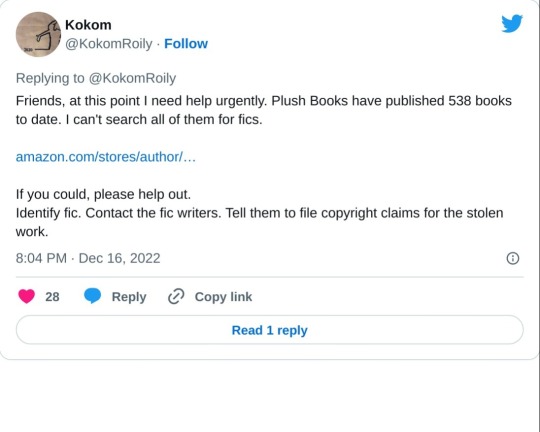
KokomRoily provides a good template to use with the Amazon DMCA takedown form (X, text version), which has limited characters, however, you will also need to search other sites too. Other sites have different legal requirements, and I'm copying the template I used here. A good way to find most of the places you need to contact is to look on Good Reads, which lists lots of the marketplaces selling the book.
Make sure you add an author note on the original story stating that this company do not have the rights to publish your fic. I strongly suggest sending this email from the email address that your fic account is registered to, in case you need to provide further evidence. Here is an email template that I put together based on the one above and modified according to the legal demands required on Barnes and Noble's takedown help page:
To whom it may concern,
I affirm under penalty of perjury that I am [YOUR AUTHOR NAME ON YOUR FIC], the author of the work "[YOUR FIC NAME]" posted at [LINK] (entire work) as a free-to-read story. My work has been stolen and published and you are currently listing the work as for sale at the following location [LINK ON MARKETPLACE] as "[BOOK NAME]" by Plush Books.
Under statute 17 USC 512, [MARKETPLACE] has a legal obligation to take down Plush Books' "[BOOK NAME]" in response to a valid DMCA takedown notice by the author. According to this statute, if "[BOOK NAME]" is not taken down, you are making [MARKETPLACE] liable to be sued. Please check with a manager to verify.
I will not be filling in my contact information such as home number and address and I am not required to do so in order for my claim to be valid. I have written in the author's note section of my story that I have not given Plush Books permission to use my work, which is proof enough that Plush Books has stolen the work from someone. If you would like more proof, I can email you screenshots of comments/kudos I've received from my readers from [DATE], the original date of publication, that are still in my inbox.
I have a good faith belief that use of the material in the manner complained of is not authorized by the copyright owner, its agent, or the law. The information in the notification is accurate, and I swear, under penalty of perjury, that I am the owner of an exclusive right that is allegedly infringed.
Please take ""[BOOK NAME]"" down.
Sincerely,
[YOUR AUTHOR NAME ON YOUR FIC]
#plush books#fanfic copyright#copyright infringement#fanfic help#psa#fanfiction#writing#fanfic#ao3#writing help
577 notes
·
View notes
Text






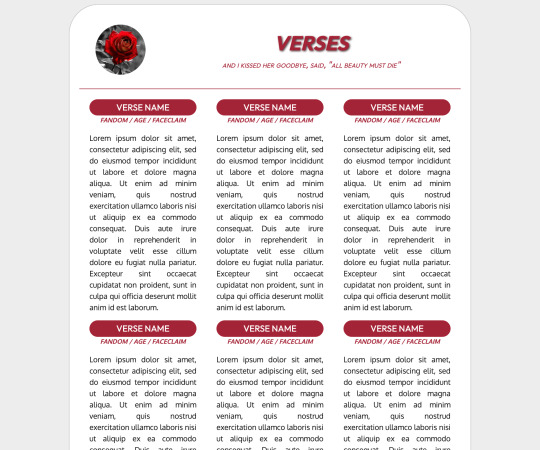
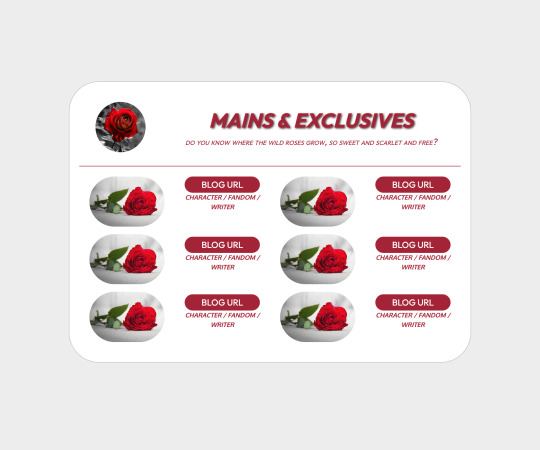
🐝 * ― 𝐂𝐀𝐑𝐑𝐃 𝐓𝐄𝐌𝐏𝐋𝐀𝐓𝐄 𝟎𝟐𝟎: 𝐖𝐇𝐄𝐑𝐄 𝐓𝐇𝐄 𝐖𝐈𝐋𝐃 𝐑𝐎𝐒𝐄𝐒 𝐆𝐑𝐎𝐖. ( after being unsuccessful in finishing any new carrd templates, i've finally managed to make a new one. this time it's a single muse template which includes a landing / navigation page, rules, about section with a dossier and enough space for a biography, verses, and a connections page. the preview can be found here. due to the number of elements used this template requires at least a pro lite account. if you want to upgrade feel free to use my referral code KB4W13V3. )
― HOW TO USE
please don’t claim this as your own, and don’t delete the credit. you can change it’s size or color but it should stay where it is.
of course, you can edit all the colors, sizes, fonts, etc. however you like.
to get this template please click here. it’s on a pay what you want basis so it is possible to get it for free if you set the amount to 0. ( if you’d like to leave a little tip i’d very much appreciate it, though. )
when you first open this template, it might look a little weird because carrd deletes the images i’ve used so there will only be empty spacers of sorts that may look a little out of place. just upload images and this will fix itself.
actual image sizes don’t matter since carrd scales them to fit but you can see examples of the image sizes i’ve used in the demo to get an idea for the dimensions. or just try your own and play around with the settings to get the desired outcome.
if you have any questions on how to edit it, just send me a message and i’ll try to explain it to you.
#carrd template#carrd templates#carrd rp template#rp template#carrd#free rp template#rp resources#free rp resources#rph#type: template#type: carrd#template: single muse
342 notes
·
View notes
Text

hi I'm Lixie, Lix, or Bunny, or Bun. Any of those work, and so will any nicknames you can manage to get out of those haha. My current groups I write for are Stray Kids and Ateez, but I've been thinking about writing for other groups, namely Seventeen and BTS, among a couple other groups.
I'm a fan of way too many groups to name, but I am always down to talk about any of them, and honestly most anything regarding k-pop in general. Or just about anything, so please feel free to ask me!
I write a variety of content on here, and currently all of it is pretty sfw, but I will be writing nsfw content eventually, so Minors DNI with any of my 18+ work that I will write or have written!! If you interact with my NSFW content and you are a minor, I will block you.
Do not repost, continue, or translate my works, whether its on here or anywhere else. I only have one account outside of Tumblr where I post my work, which is AO3, so if you see my work outside of that one account, it's not me.

about me | masterlist | rules | taglists | Side blog (I post fake texts on this one)
networks: @newworldnet
tags: #lixie things #lixie updates #personal stuff are all of my tags about my personal life and things happening to me

Can't Stay Away from You - Skz x reader a/b/o
The Invisible Strings that Bind Us - Skz x reader soulmate au
When Eight Becomes Nine - Atz x 9th member!reader a/b/o
Bouncy Mini-Series - Ateez x reader in the Bouncy universe
First Dates with SKZ - series with @herarcadewasteland
Navigation and support banner templates that I used belong to cafekitsune and the template can be found here.
21 notes
·
View notes
Text
DAILY REMINDER TO BOYCOTT HYBE
BOYCOTTS AND PRESSURE IS WORKING! we're getting attention from big media outlets + locals (and positive feedback from them) + stocks are falling! AND THAT'S THE ONLY THING BIG CORPORATIONS CARE ABOUT: MONEY.
IT'S IMPORTANT TO DEPLATFORT ZIONISTS LIKE SC**TER, IT SHOULD BE NORMALIZED LIKE KICKING OUT NAZIS AND OTHER RACISTS AND NOT GIVING THEM A PLATFORM TO SPREAD THEIR PROPAGANDA OR GIVE THEM MONEY TO FOUND/SUPPORT IT.
HYBE started panicking hence their bs statement trying distancing themselves from 🛵's views (always the first pr step) SO WE HAVE TO KEEP THE PRESSURE GOING!
loona stans managed freeing them from their shady company by completely boycotting their comeback & any other content + boycotts have been historically proven to be important for social movements along w donating & demonstrating (see BDS movement) - so don't listen to anyone saying boycotts wouldn't work!
SEND EMAILS AND PHYSICAL MAILS TO HYBE (templates & addresses here)
SIGN THE PETITION
IF YOU'RE FROM CALI, GO TO THE PROTEST AT HYBE AMERICA'S HQ ON THE 21ST & 22ND MARCH
SPAM THEIR SNS W THE #HYBEDIVESTFROMZIONISM #하이브는시오니스트를퇴출하라 TAGS
PLEASE DON'T GIVE THEM ANY PENNY FROM YOUR MONEY! DON'T BUY MERCH, ALBUMS AND 🏴☠️ CONTENT (I know many already do so w paid video content & online concerts so keep it up and also 🏴☠️ stream, do it the old school way: listen to your already bought CDs, reuploaded videos from non-company yt accounts or download songs w mp3 converters)
SPREAD!
AND THIS DOESN'T ONLY GO FOR HYBE BUT ALSO HYBE AMERICA ARTISTS!
Here's a full list of artists under HYBE & HYBE AMERICA (+THEIR SUB-LABEL QUALITY CONTROL):
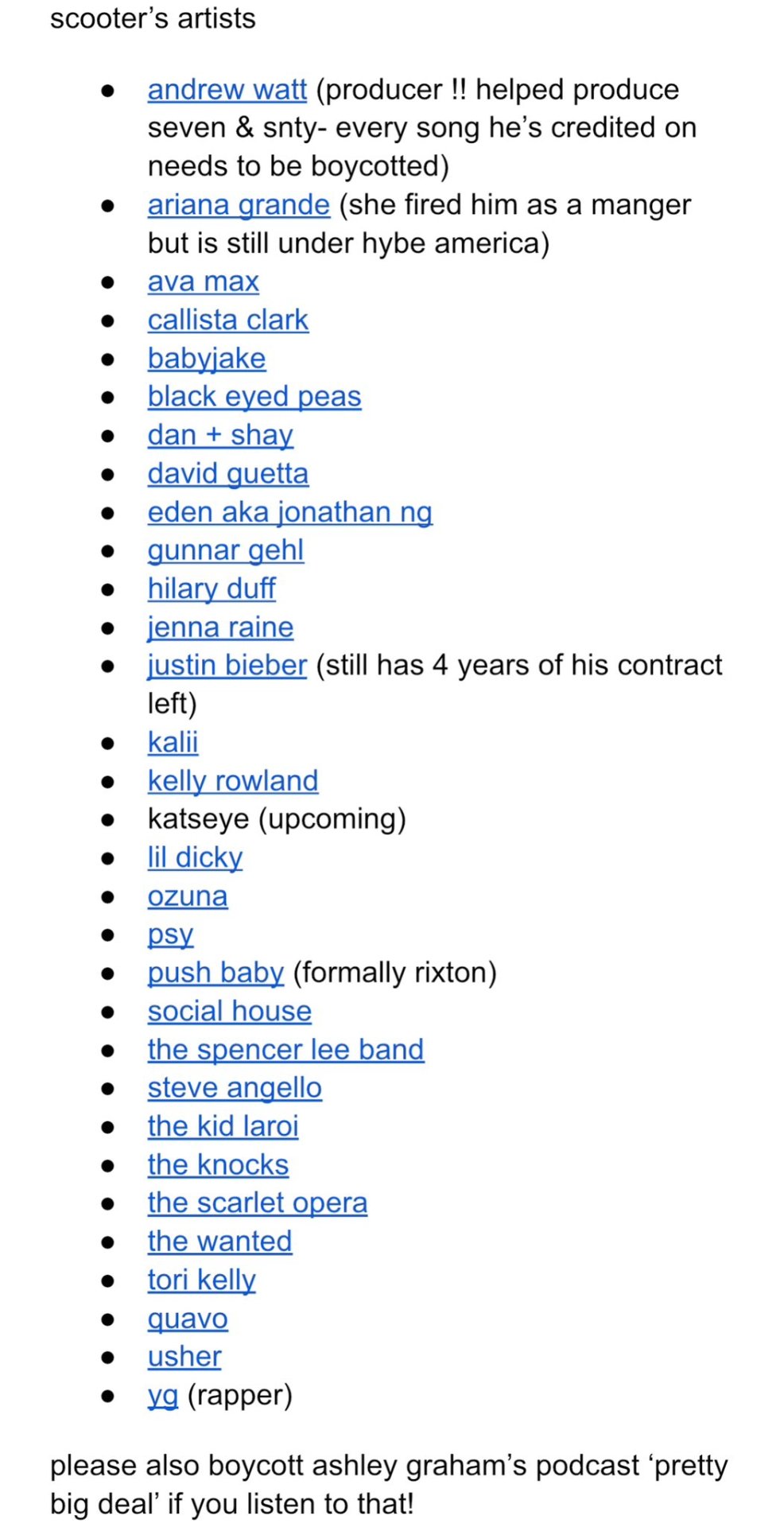
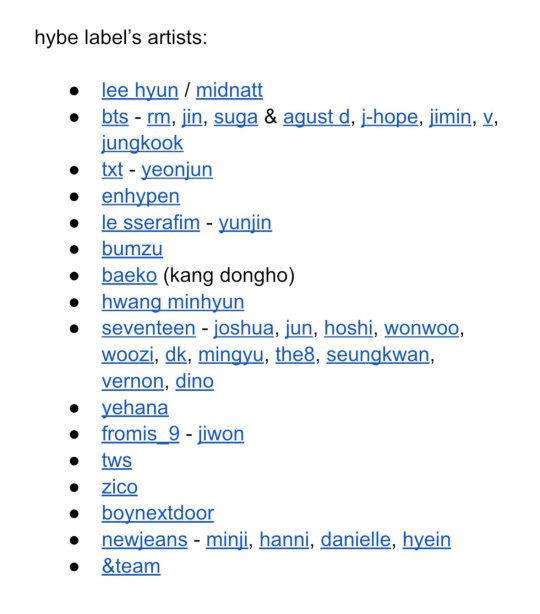
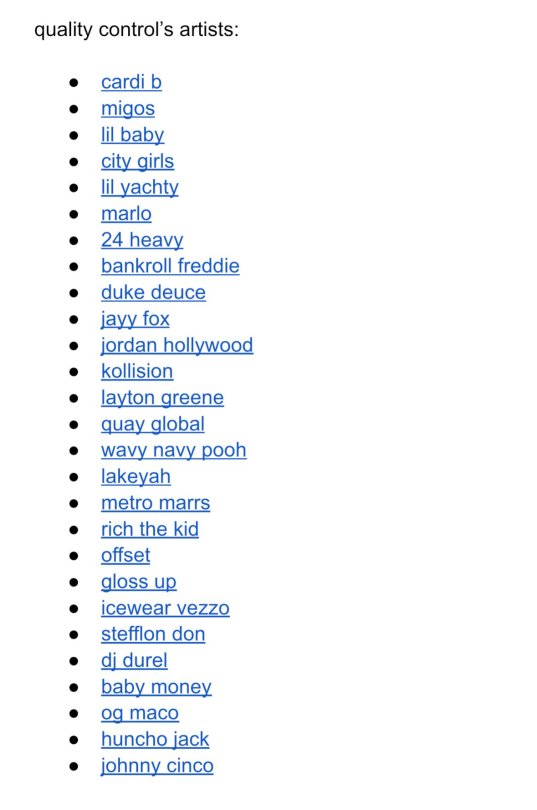
Obviously all the other non-kpop fandoms (especially Taylor Swift's) are also invited to join us in getting rid of this man!!
If you know any, let them know!
#kpop#hybe#hybe labels#bts#txt#enhypen#le sserafim#newjeans#boynextdoor#seventeen#svt#tomorrow x together#fromis_9#tws#illit#andteam#hybe America#free palestine#anti zionisim#current events#free gaza#fromis 9#&team#lesserafim
30 notes
·
View notes